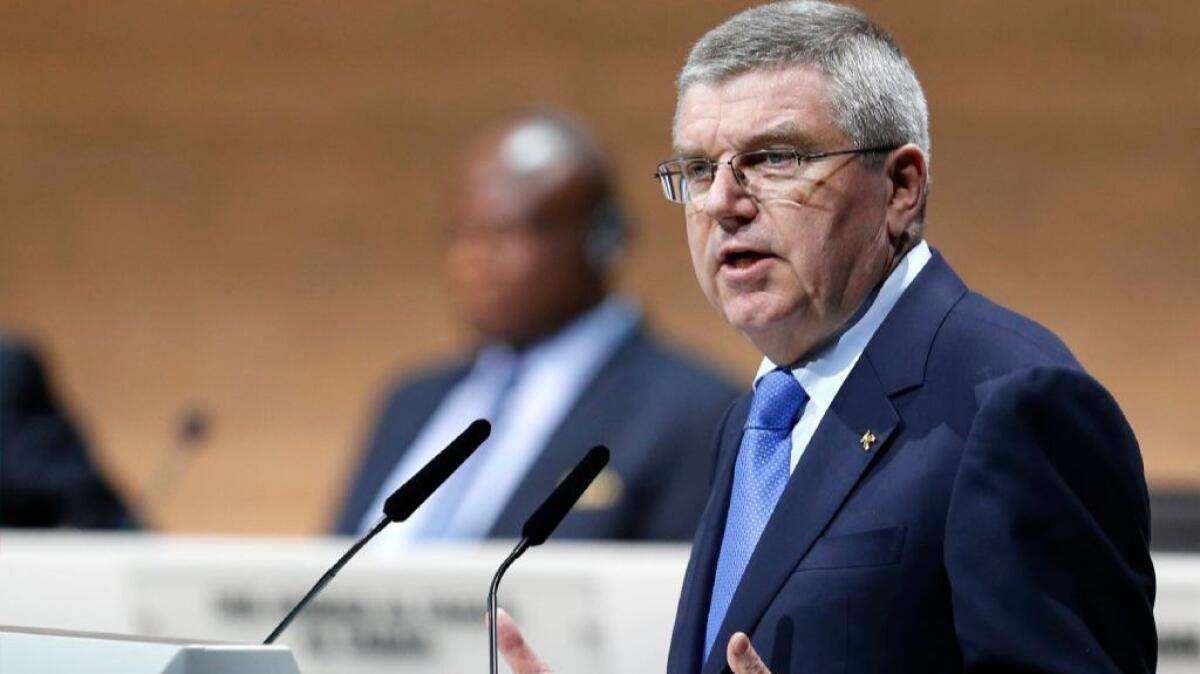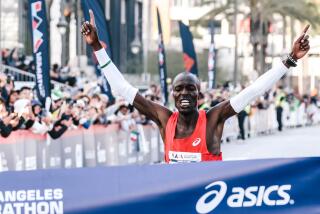Commentary: It’s time for the International Olympic Committee to step up and pay its fair share

The International Olympic Committee has long run itself like a profit-gobbling cartel. In the process, its leaders have shown no small amount of egoism. When IOC President Thomas Bach asked his vice presidents to assess the possibility of awarding both the 2024 and 2028 Games at once, he assumed the bid cities would go along. He said, “We are in a comfortable situation. Now it will be up to the working group how to best explore, how to best exploit, the positive situation.”
Bach is not only smug, but he’s also wrong. This is actually a “positive opportunity” for the bid teams in Los Angeles and Paris to extract a better deal from the IOC. After years of lopsided dealings between the IOC and the host city in which everyday people shoulder the costs while the IOC and their partners monopolize the benefits, the time is right for a relationship reboot.
The IOC will not be keen. It will claim, as it always does, that the group contributes mightily to the operating costs of the Olympics. But with Rio Summer Olympics venues festering in the rear-view mirror, this position drips with insincerity. Operating costs are only a fraction of the overall price tag of the Games, and taxpayers in the host city and country end up bearing the burden.
Let’s be clear: There is plenty of money floating around IOC circles. The group has a reported reserve fund of about $1 billion. It recently broke ground on a shiny new headquarters in Lausanne, Switzerland, that will reportedly cost $159 million. And money will continue to flow into IOC coffers. NBC Universal signed a $7.75-billion deal to broadcast the Olympics from 2022 through 2032. The agreement covers all media platforms, including Internet, mobile and television.
Individual members of the IOC are doing just fine, too. John Coates of Australia —one of Bach’s vice presidents — receives more than $700,000 a year to run the Australian Olympic Committee. That doesn’t count all the freebies he gets as a member of the IOC. In fact, as a vice president and member of the executive board, he gets a $900 per diem when he’s on Olympic duty. Such high rolling only encourages corruption. During the 2016 Rio Games, Irish Olympic head and longtime IOC member Patrick Hickey was snatched from his five-star hotel and charged with ticket scalping.
Bid teams from Los Angeles and Paris should join forces and ask for more funding from the IOC. The IOC always boasts of contributing a sizable portion of the operating costs of the Games. For too long, the IOC has claimed that the city doesn’t have to build new infrastructure, that it’s the city’s decision. Of course host cities have to build new venues if they actually want to host the Games. Whitewater kayak venues don’t grow on trees.
In truth, the IOC chips in for operating costs by essentially laundering money from its lucrative corporate sponsorships and television-rights deals. That’s all well and good, but it’s time the organization stepped up and contributed to infrastructure costs as well. As the Economist recently pointed out, over the years, the IOC has actually reduced the amount of television money it shares with local Olympic organizing committees. In 1992, the IOC doled out nearly 70% of the TV spoils to Barcelona, these days, less than 30% is the norm. Los Angeles and Paris should insist that trend be reversed.
The aspiring bid cities for the 2024 Games should also ask the IOC to dial back its opulence and to shift those funds toward a special ticket program for people in the city who would not otherwise be able to afford to attend. During the bidding process for the 2022 Winter Olympics, Oslo made public the Olympic luminaries’ exorbitant demands, which are embedded in the host city contract — from private meetings with Norway’s king to strict room temperature protocols to fully stocked hotel bars — it became a joke on the late-night talk-show circuit. IOC members have become too accustomed to privilege. It’s time to spread the fun around to people who are typically excluded from the five-ring spectacle.
Los Angeles and Paris should demand the IOC assume more of the risk for cost overruns. Since 1960, every single Olympics with reliable data has gone over budget, by an average of 156% in real terms. Sure, both cities have scaled back their bids, but there’s always the chance that costs will still catapult over budget. If they do, the IOC should be there to help.
Bach and his ilk have glibly assumed that both cities will go along with the plan to award 2024 and 2028 at the same time. But neither city has fully signed on. Paris bid leader Tony Estanguet bluntly said: “There will be no Games in Paris in 2028…. It was very clear with our partners and leaders that we are only bidding for 2024.” He added, “It is now or never with Paris.”
Los Angeles Mayor Eric Garcetti echoed this sentiment: “We are competing for 2024… Full stop.” This sort of incipient rambunctiousness would have been unthinkable even a few years ago when the Olympic machine was humming on all cylinders.
Neither Los Angeles nor Paris can admit publicly that 2028 is an option. They’ll claim a laser-focused eye on 2024. But if indeed one bid committee could live with the 2028 Games, then behind the scenes and off the record they would do well to aggressively press concessions from the IOC, concessions that would lessen the burden on everyday people in the host cities and that would defray the risks. For too long host cities have shouldered the costs of the Games while the IOC and their corporate comrades have strolled away with the spoils. But we’re in a new era. The IOC is a uniquely weak position. If aspiring host cities don’t leverage their advantage now, then when will they?
Jules Boykoff teaches political science at Pacific University. He is the author of three books on the Olympics, most recently “Power Games: A Political History of the Olympics.”
More to Read
Go beyond the scoreboard
Get the latest on L.A.'s teams in the daily Sports Report newsletter.
You may occasionally receive promotional content from the Los Angeles Times.






